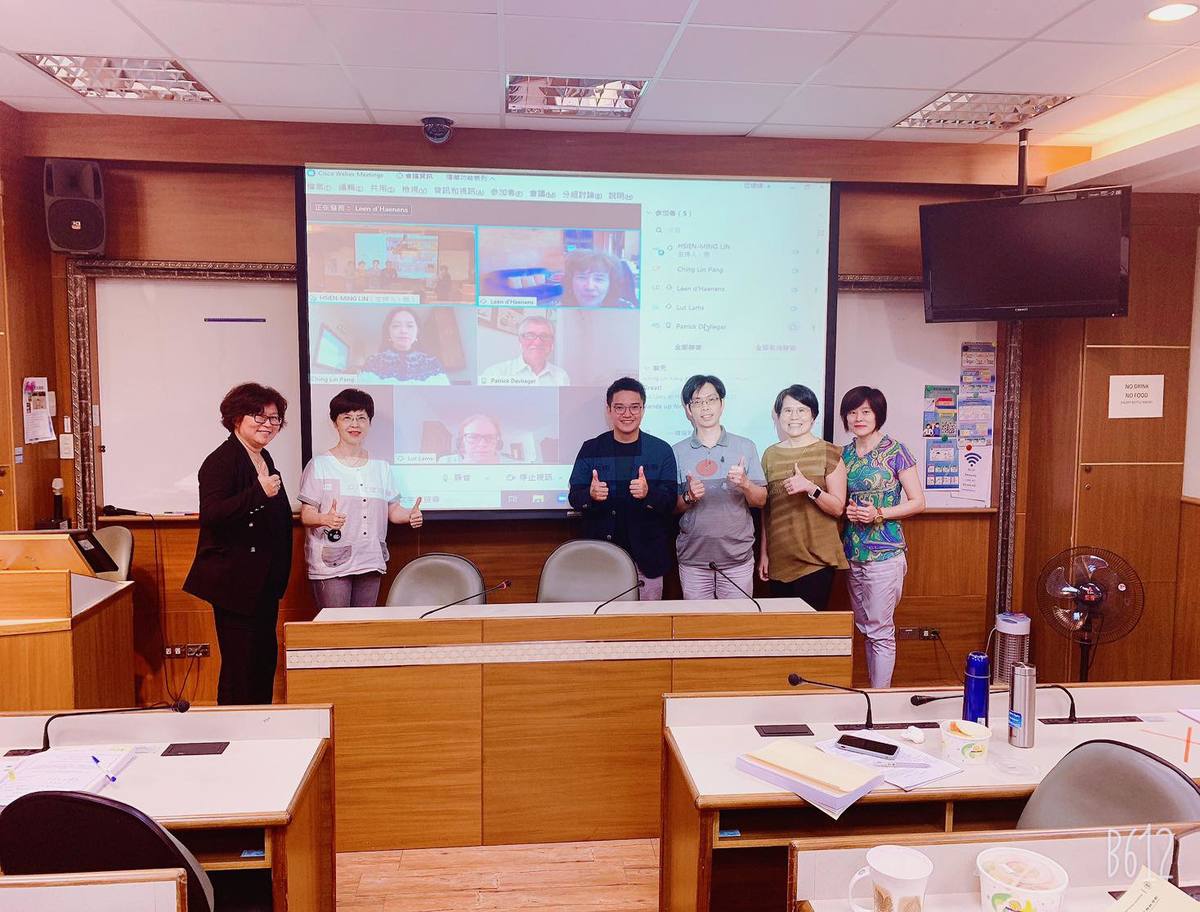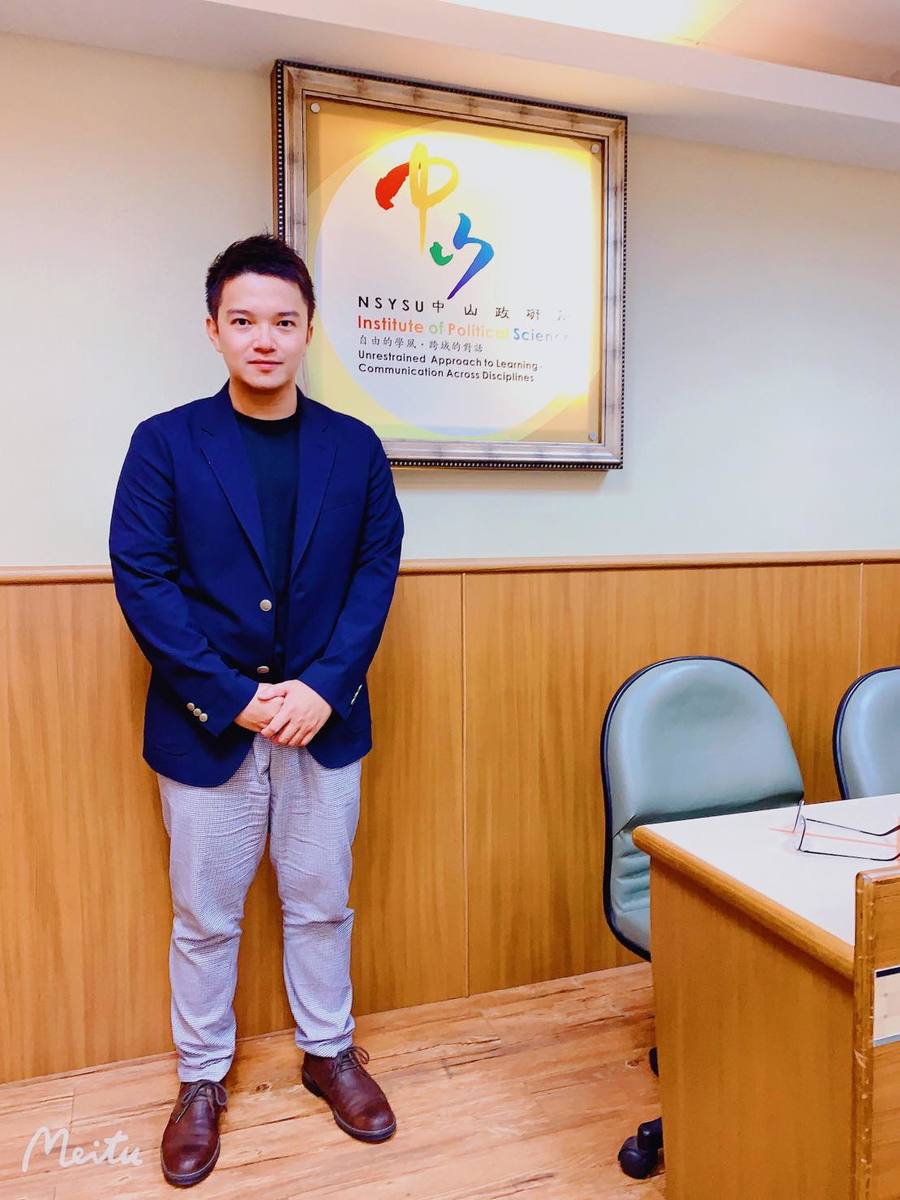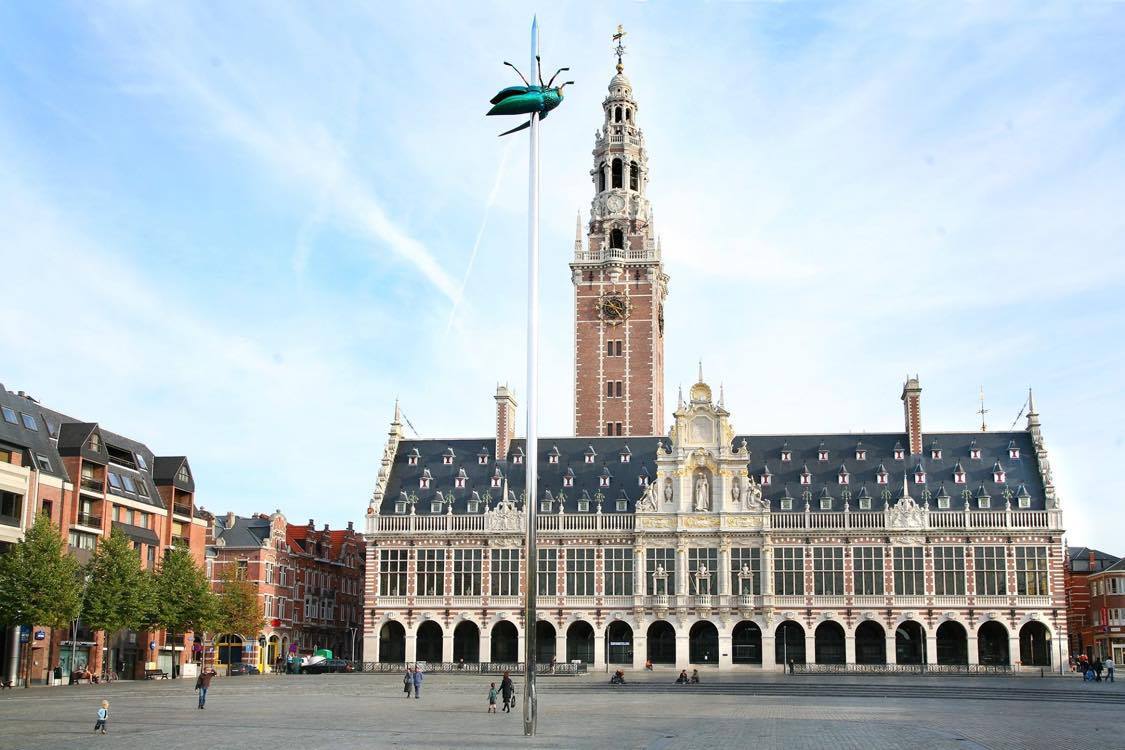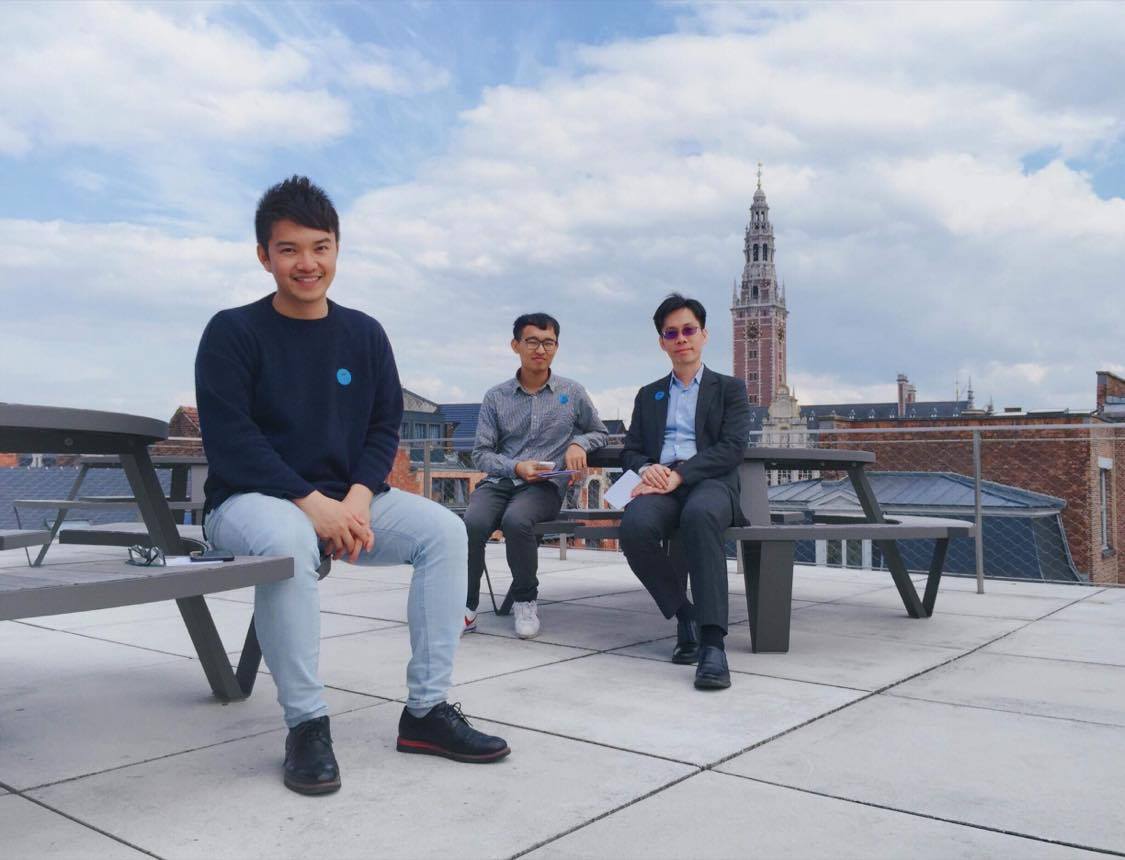Hsien-Ming Lin became the first graduate of double-degree doctoral program between Institute of Political Science at NSYSU and Interculturalism, Migration and Minorities Research Centre at KU Leuven




Hsien-Ming Lin defended his PhD thesis on September 11th, 2020, becoming the first graduate of the double-degree doctoral program established in 2011 between the Institute of Political Science (IPS) at National Sun Yat-sen University and the Interculturalism, Migration and Minorities Research Centre (IMMRC), Faculty of Social Sciences, KU Leuven – the oldest and highest-ranking university in Belgium. The program is not only about the joint supervision of students’ thesis – Lin had to fulfill the requirements of both universities and demonstrate interdisciplinary research capacity in both political sciences and anthropology.
During his three-year stay in Belgium at the IMMRC, which focuses on “research on changing practices of social formation as well as cultural and religious co-creation at the nexus of diversity and inequality, migration and mobility”, Lin passionately engaged in anthropological research on the Taiwanese immigrant community: their identity negotiations, working experiences, home-making practices, and interaction between its members and with the host society. In September, in front of the eight-member committee, he introduced and successfully defended his PhD thesis – “Searching for Home in the Migrant Nexus: Exploring Small and Big Home-Making Experiences through Belgian Taiwanese Immigrants' Life Story Narratives”, supervised both by Prof Da-Chi Liao (NSYSU) and Professor Ching Lin Pang (KU Leuven). Having conducted 42 interviews with Taiwanese immigrants in Belgium: restaurateurs, highly skilled workers, working holiday makers, Belgians’ Taiwanese spouses (whether opposite- and same-sex spouses), he came to a conclusion that the notion of home of an immigrant is influenced by the intersection of an individual’s personal background and that “home for immigrants in the migration context is dynamic, fluid, and multidimensional” – a compound of private dwellings, familiar environments, social networks, and emotional attachments rather than a physical building. Lin also noted that his interviewees were more likely to perform the Taiwanese part of their identity in private settings, while giving in to the cultural pressure of “performing as Belgian” in the public context or interacting with Belgian counterparts, because “as a minority or immigrants, you are expected to show that you know this place and culture, and willing to integrate into the mainstream society”.
Before he embarked on his European academic adventure and dived into the field of social and cultural anthropology at IMMRC, Lin acquired solid foundations of knowledge and research methods in social and political sciences at IPS. When he came to Belgium, it took him one year to adjust – “I could not only think as a political scientist. I had to learn to think as an anthropologist, since these two disciplines ask very different questions and hold very different ontological viewpoints”, he said. Political science concentrates more on the macro- or meso-level issues (such as how governments and political institutions work and what are the relations between countries), while anthropology pays more attention to studying people’s daily life and real experiences; “it’s a really different angle for doing research”, he explained. Lin admitted that crossing the disciplinary boundaries and finding the balance between the approach of both science fields was his biggest challenge. This experience gave Lin complimentary viewpoints and broadened his view in doing research by asking “not only top-down questions but also bottom-up questions”.
The change of study environment was also an experience in itself for Lin. The stay in Belgium allowed him to learn more about the European perspective and experience the cosmopolitan feeling of this small country with a population estimated at 11.5 million, which capital – Brussels – home to many foreign residents and people with immigrant background, hosts institutions of the European Union (EU). In Lin’s view, Belgium is a good destination for studying abroad: it offers high-quality academic education, relatively cheap tuition fees, and fairly many English-taught programs. Besides, it is relatively easy to communicate with locals in English, despite it being a Dutch and French-speaking country. What’s more, with a Schengen visa, one can travel to all 27 EU member states. However, students wishing to stay in Belgium after graduation might encounter the obstacle of employment restrictions. Besides, the lack of fluency in Dutch or French might reduce local companies’ motivation to hire international applicants.
The program not only let Lin earn a double PhD degree in a shorter time (5 years) from both NSYSU and KU Leuven respectively but also experience an utterly different education system. Lin said that generally, to study a PhD program in Europe, you have to have a clear vision of your project; then you concentrate on your independent research, while in Taiwan (where the higher education system is more similar to the US system), doctoral students need to first take courses and pass the PhD candidate qualification exam, and only then they can start preparing the outline of their PhD thesis. Lin admitted that the courses at IPS were a good preparation for further research at IMMRC.
Read more about the double degree doctoral program at the Institute of Political Science at NSYSU and the Interculturalism, Migration and Minorities Research Centre at KU Leuven:
https://ips.nsysu.edu.tw/phd/double_degree
During his three-year stay in Belgium at the IMMRC, which focuses on “research on changing practices of social formation as well as cultural and religious co-creation at the nexus of diversity and inequality, migration and mobility”, Lin passionately engaged in anthropological research on the Taiwanese immigrant community: their identity negotiations, working experiences, home-making practices, and interaction between its members and with the host society. In September, in front of the eight-member committee, he introduced and successfully defended his PhD thesis – “Searching for Home in the Migrant Nexus: Exploring Small and Big Home-Making Experiences through Belgian Taiwanese Immigrants' Life Story Narratives”, supervised both by Prof Da-Chi Liao (NSYSU) and Professor Ching Lin Pang (KU Leuven). Having conducted 42 interviews with Taiwanese immigrants in Belgium: restaurateurs, highly skilled workers, working holiday makers, Belgians’ Taiwanese spouses (whether opposite- and same-sex spouses), he came to a conclusion that the notion of home of an immigrant is influenced by the intersection of an individual’s personal background and that “home for immigrants in the migration context is dynamic, fluid, and multidimensional” – a compound of private dwellings, familiar environments, social networks, and emotional attachments rather than a physical building. Lin also noted that his interviewees were more likely to perform the Taiwanese part of their identity in private settings, while giving in to the cultural pressure of “performing as Belgian” in the public context or interacting with Belgian counterparts, because “as a minority or immigrants, you are expected to show that you know this place and culture, and willing to integrate into the mainstream society”.
Before he embarked on his European academic adventure and dived into the field of social and cultural anthropology at IMMRC, Lin acquired solid foundations of knowledge and research methods in social and political sciences at IPS. When he came to Belgium, it took him one year to adjust – “I could not only think as a political scientist. I had to learn to think as an anthropologist, since these two disciplines ask very different questions and hold very different ontological viewpoints”, he said. Political science concentrates more on the macro- or meso-level issues (such as how governments and political institutions work and what are the relations between countries), while anthropology pays more attention to studying people’s daily life and real experiences; “it’s a really different angle for doing research”, he explained. Lin admitted that crossing the disciplinary boundaries and finding the balance between the approach of both science fields was his biggest challenge. This experience gave Lin complimentary viewpoints and broadened his view in doing research by asking “not only top-down questions but also bottom-up questions”.
The change of study environment was also an experience in itself for Lin. The stay in Belgium allowed him to learn more about the European perspective and experience the cosmopolitan feeling of this small country with a population estimated at 11.5 million, which capital – Brussels – home to many foreign residents and people with immigrant background, hosts institutions of the European Union (EU). In Lin’s view, Belgium is a good destination for studying abroad: it offers high-quality academic education, relatively cheap tuition fees, and fairly many English-taught programs. Besides, it is relatively easy to communicate with locals in English, despite it being a Dutch and French-speaking country. What’s more, with a Schengen visa, one can travel to all 27 EU member states. However, students wishing to stay in Belgium after graduation might encounter the obstacle of employment restrictions. Besides, the lack of fluency in Dutch or French might reduce local companies’ motivation to hire international applicants.
The program not only let Lin earn a double PhD degree in a shorter time (5 years) from both NSYSU and KU Leuven respectively but also experience an utterly different education system. Lin said that generally, to study a PhD program in Europe, you have to have a clear vision of your project; then you concentrate on your independent research, while in Taiwan (where the higher education system is more similar to the US system), doctoral students need to first take courses and pass the PhD candidate qualification exam, and only then they can start preparing the outline of their PhD thesis. Lin admitted that the courses at IPS were a good preparation for further research at IMMRC.
Read more about the double degree doctoral program at the Institute of Political Science at NSYSU and the Interculturalism, Migration and Minorities Research Centre at KU Leuven:
https://ips.nsysu.edu.tw/phd/double_degree
Click Num:
Share
